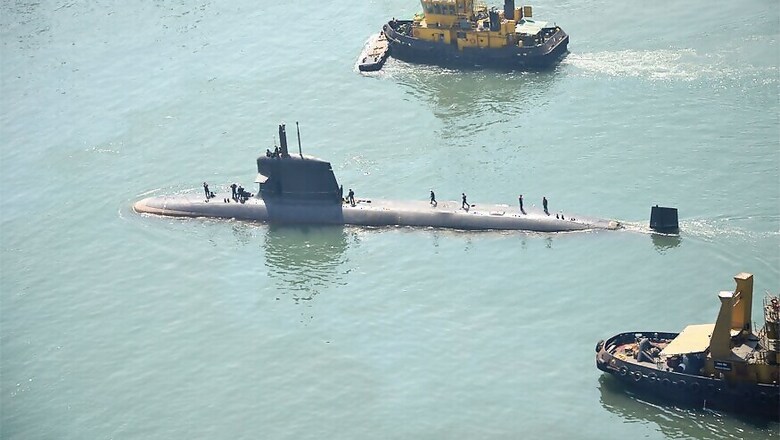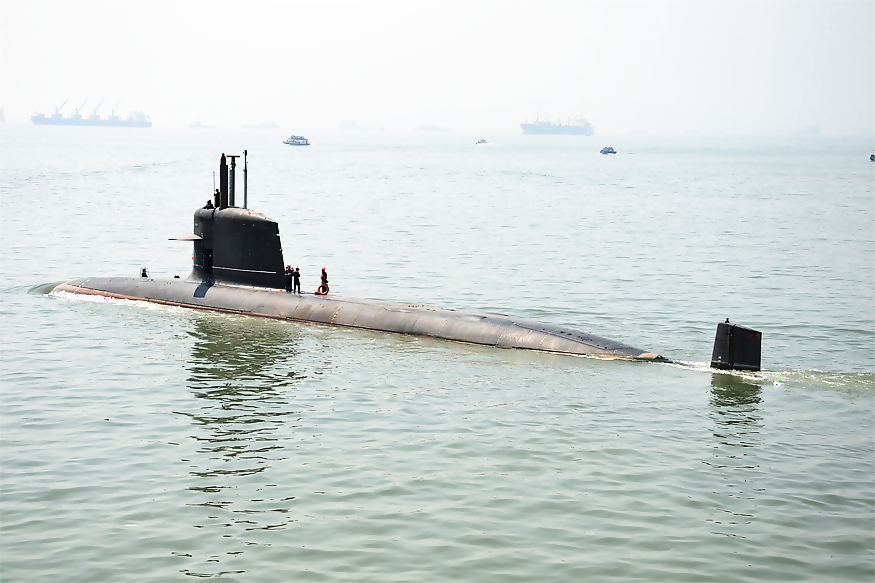
views
Mumbai: 'Kalvari' (Tiger Shark), the first of the six French Scorpene class submarines being built at the Mazagon Dock Shipbuilders Ltd for the Indian navy, went to sea for the first time on Sunday, an official said here.
The submarine sailed out at about 10 am under her own propulsion for her first sea trial, off the Mumbai coast.
During the sortie, a number of number of preliminary tests on the propulsion system, auxiliary equipment and systems, navigation aids, communication equipment and steering gear were performed, the official said, adding various standard operating procedures were also validated for this new class of submarines before she returned to harbour in the evening.
Over the next few months, the submarine will undergo a barrage of sea, surface, diving, weapons, noise trials, etc testing her to the extremes of its intended operating envelop.
Later, she will be commissioned into the Indian Navy, giving a major boost to the 'Make In India' initiative of the government.
She is part of the ongoing project for constructing six Scorpene class submarines, in collaboration with DCNS of France, which will include transfer of technology to MDL.

In April 2015, Defence Minister Manohar Parrikar had directed that all-out efforts be made to complete the project on schedule after which teams from MDL, Indian Navy and DCNS worked round-the-clock on it.
The submarine was undocked on pontoon on April 6, 2015 in Parrikkar's presence, underwent vacuum tests and battery loading at Naval Dockyard before returning to the MDL for completion of the basin trials and harbour acceptance trials phase.
The state-of-art features of Scorpene include suerpior stealth to launch a crippling attack on enemies with precision-guided weaponry, including torpedoes, tube-launched anti-ship missiles both underwater and on surface.
The Scorpene submarines are designed to operate in all areas including the tropics, and encompass all means and communications to ensure interoperability with other components of a Naval Task Force.
They can undertake multifarious missions like anti-surface warfare, anti-submarine warfare, intelligence gathering, mine laying, area surveillance, etc.
The submarine class are built from special steel capable of withstanding high-yield stress with high tensile strength that allows them to bear high hydrostatic force and enable deep diving for enhanced stealth.
She was built according to modular construction principle, which divides it into a number of sections and building them in parallel.
The complexity of the task can be gauged from the fact that it involves laying around 60 km cables and 11 km pipes in extremely congested and limited spaces inside the submarine.
The Scorpene is equipped with weapons launching tubes (WLT), and its weapons can be easily reloaded at sea with special handling and loading equipment.
The array of weapons and complex sensors fitted on board the Scorpene are managed by a high technology combat management system.
India joined the elite submarine building nations on February 7, 1992 with the commissioning of the first indigenously-built sub, INS Shalki at the MDL. It is still in service.
The MDL has constructed different types of warships including Leander and Godavari class frigates, Khukri class corvettes, Delhi and Kolkata class destroyers, Shivalik class stealth frigates, 1241 RE Missiles boats, Shalki class subs, P-15B class destroyers, the first of which was launched in April 2015, and the P-17A class stealth frigates, a follow-up on the P-17 stealth frigates.



















Comments
0 comment